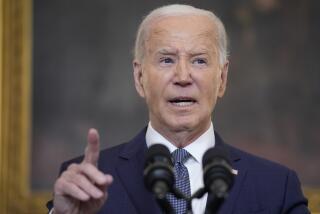Baker Spurns Request by Israel to Alter Peace Plan : Mideast: The secretary hints that Bush might snub Shamir by not meeting the prime minister on his upcoming U.S. visit.
WASHINGTON — Hinting broadly at an extraordinary snub of Israeli Prime Minister Yitzhak Shamir, Secretary of State James A. Baker III said Wednesday that he is reluctant to change his Middle East peace proposals in response to Israeli demands because that would only produce other demands from the Arabs.
Although Baker said he will continue his effort to foster a dialogue between Israel and representative Palestinians, he did little to disguise his annoyance at Shamir for refusing to budge on two Israeli positions that apparently make the entire process unacceptable to prominent Palestinians.
Shamir hopes to put his case to President Bush next month when he visits Washington. But the trip is officially regarded as a private one, and so far, the White House has not put a Shamir-Bush meeting on the President’s schedule.
Asked at a White House press conference to comment on the possibility that Bush might snub the Israeli leader, Baker replied: “I’m not familiar with what the President’s schedule is three to four weeks in advance.”
If Bush wants to meet with Shamir, of course, a place would be made for him on the schedule. In the past, no Israeli prime minister has visited Washington without receiving an invitation to the White House.
In a letter that the Israeli Embassy described as conciliatory, Foreign Minister Moshe Arens told Baker on Tuesday that Israel accepts Baker’s five-point peace plan “in principle.” But Shamir’s government is demanding two changes that U.S. officials believe would scuttle the process because Palestinians would refuse to participate.
The Baker plan was intended to bring Israelis and Palestinians together to negotiate conditions for Palestinian elections in the Israeli-occupied West Bank and Gaza Strip as the first step toward a peace settlement.
Baker promised to consider Shamir’s proposed amendments, but added: “If we start making changes for one side, we will find ourselves in an extended negotiating session in terms of making changes that might be requested, for instance, by Egypt.
“It would be much better if both sides would accept the five points as a general framework for moving forward, and then let’s get about the business, the hard, nitty-gritty business, of sitting down face to face and determining what the rules are that would govern the conduct of elections in the (occupied) territories.”
On other topics, Baker:
-- Praised the reformist program of South Africa’s newly elected president, Frederik W. de Klerk.
“I think it would be inappropriate now to move forward with further sanctions in the light of the . . . obvious efforts of that new government to move in the right direction,” Baker said.
-- Described continuing weapons shipments to leftist guerrillas in El Salvador as a “major stumbling block” to improved U.S.-Soviet relations, although he said it is possible that Nicaragua has been sending weapons without Moscow’s knowledge or approval.
He said that Soviet Foreign Minister Eduard A. Shevardnadze has offered the United States assurances that shipments have stopped, although Honduran authorities this month intercepted a major consignment of weapons bound from Nicaragua to El Salvador.
“It would appear to me that maybe the Nicaraguans are telling them (the Soviets) one thing and doing something else,” Baker said. “I hope that’s the . . . right interpretation to put on it.”
More to Read
Sign up for Essential California
The most important California stories and recommendations in your inbox every morning.
You may occasionally receive promotional content from the Los Angeles Times.










